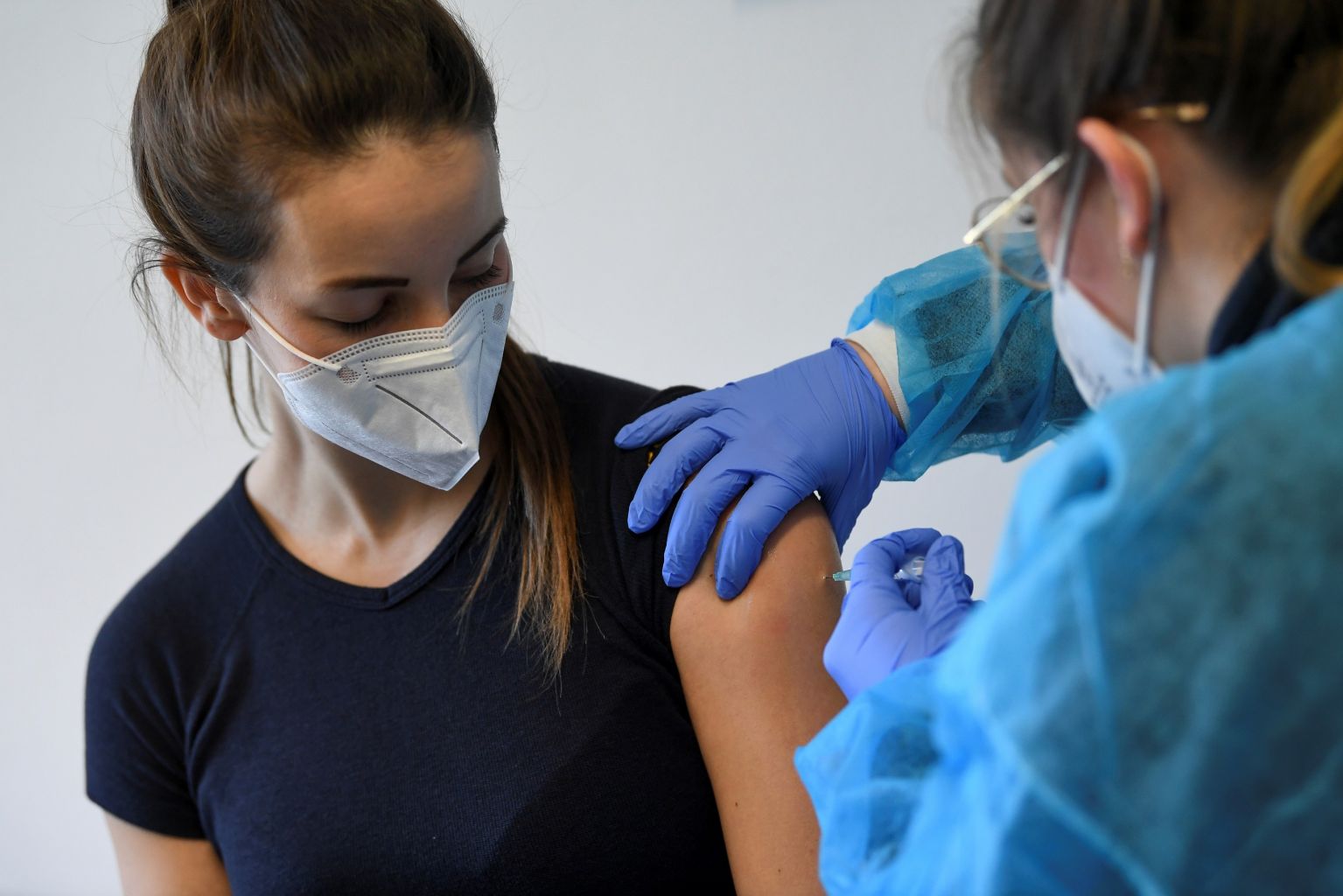EU officials defend export bans, deny 'vaccine nationalism'
Sign up now: Get ST's newsletters delivered to your inbox

A German police staff member receives AstraZeneca's vaccine in Munich, Germany.
PHOTO: REUTERS
LONDON - A top European Union official has rejected accusations that his continent is engaged in "vaccine nationalism" by banning their export.
Charles Michel, who heads the European Council, the body which brings together all the heads of states and governments of the EU, defended the principle of controlling the export of vaccines produced in EU countries, invoked by Italy last week to block a shipment of AstraZeneca doses to Australia.
"Our objective is to prevent companies from which we have ordered and pre-financed doses from exporting them to other advanced countries when they have not delivered to us what was promised", said Mr Michel.
But the former prime minister of Belgium quickly ran into fresh controversy when he charged that the United Kingdom was applying its own bans on the free movement of vaccine products.
That earned a swift rebuke from the authorities in London.
"Any references to a UK export ban or any restrictions on vaccines are completely false," retorted an angry British government spokesman, dispensing with diplomatic niceties.
European governments have faced serious domestic criticism for not securing enough vaccines and rolling vaccination programmes far too slowly.
Particularly galling have been comparisons with the UK which only left the EU last year; up to 40 percent of the people in Britain have now received at least one shot of the vaccine, more than four times as many as in the EU.
And while the British appear to suffer no shortages of doses, the European Commission, the EU's executive body tasked with the centralised procurement of vaccines, has constantly struggled to secure supplies.
Some of the shortages are due to a breakdown in production at the European plants of AstraZeneca, a British-Swedish company manufacturing the vaccine developed by the UK's Oxford University. The fact that AstraZeneca's British-based assembly lines are humming along at full capacity while the European ones are sputtering only adds another political dimension to the dispute.
Responding to public uproar, the European Commission in early February instituted a vaccine export mechanism.
Initially, the ban appeared to be just a gesture: EU statistics indicate that throughout the month of February not one of the 174 applications which EU-based pharmaceutical companies made to export their products outside Europe were denied, although many of these were for small quantities.
But, behind the scenes, Italian Prime Minister Mario Draghi campaigned for the EU export ban to be applied as intended. One reason for this is that Mr Draghi, whose coalition government has only recently taken power in Italy, is determined to show that he can deliver an accelerated vaccination campaign.
Mr Draghi is also in the forefront of European leaders arguing that AstraZeneca cannot be relied upon to deliver the 40 million doses it promised the EU for the first quarter of this year, or the 180 million doses the company pledged to supply during the second quarter.
The fact that AstraZeneca was proposing to export to Australia some vaccines produced in its plant in the small town of Anagni just south of the Italian capital of Rome proved to be the last straw for Mr Draghi.
Italy's export ban is largely symbolic: only 250,000 doses are affected. But it is designed as a warning to pharmaceutical companies.
All eyes are now on the EU's decision on Friday (12 March), when officials will have to agree on whether to renew the ban on vaccine exports. The Italians are campaigning for such a renewal, and the European Commission's decision to support Italy's move indicates that a renewal is very much on the cards.
But EU officials are now struggling with another development: a decision of some member-states such as Hungary, the Czech Republic and Slovakia, to turn to Russia and China to fill the gaps in their vaccine programmes.
The European Medicines Agency, the Union's regulator, has now agreed to review the safety and effectiveness of Russia's Sputnik V, and a company has agreed to produce it in Italy.
But Mr Michel has lashed out at the possibility that China and Russia may now supply the EU's needs.
"We should not let ourselves be misled by China and Russia, both regimes with less desirable values than ours, as they organise highly limited but widely publicised operations to supply vaccines to others", he said on Tuesday.
Pointing out that both Russia and China had vaccinated even fewer people at home than the EU, Mr Michel vowed that "Europe will not use vaccines for propaganda purposes."
The possibility that his own statements can also be interpreted as playing politics with vaccine delivery is not something which appears to trouble the former Belgian leader .


